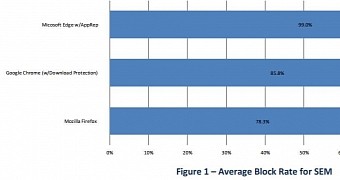Microsoft has been working hard on making Edge a more advanced browser, and while the number of improvements might not be too impressive at first, the under-the-hood tweaks seem to be pretty effective.
This is the result of a new research conducted by NSS Labs, who tried to determine the most secure browser on the market when it comes to socially engineered malware (SEM) and phishing attacks. The organization tested three different browsers, namely Google Chrome, Mozilla Firefox, and Microsoft Edge, and it turns out that the default Windows 10 browser is actually the most secure.
NSS Labs said that its test comprised 220,918 cases, out of which 5,224 were unique suspicious samples and 304 qualified for the test.
Microsoft Edge performance
Microsoft Edge managed to block no less than 99 percent of the samples thanks to SmartScreen URL filtering and Application Reputation (App Rep), while Google Chrome blocked 85.8 percent, also thanks to technologies that were specifically integrated with this purpose in mind, such as URL filtering and Download Protection. Mozilla Firefox blocked only 78.3 percent of the samples.
Furthermore, Microsoft Edge was the fastest to block new SEM, the study shows. It needed less than 10 minutes to effectively protect systems of malware, while Google Chrome required an average of two hours and 39 minutes to do the same thing. Mozilla Firefox blocked malware in approximately three hours and 45 minutes.
As far as zero-hour protection is concerned, Microsoft Edge was once again the most effective, reaching a 98.7 percent protection rate for new malware. Google Chrome was pretty close with 92.8 percent, while Firefox was third with 78.3 percent.
In the end, it turns out that Microsoft Edge is actually a pretty advanced browser in terms of security, and while it has a hard time getting closer to rivals Google Chrome and Firefox in terms of market share, tests like these show that it’s really worth a chance. In case you’re wondering, NSS Labs says the test was fully independent, and no compensation was received to run it.

 14 DAY TRIAL //
14 DAY TRIAL //